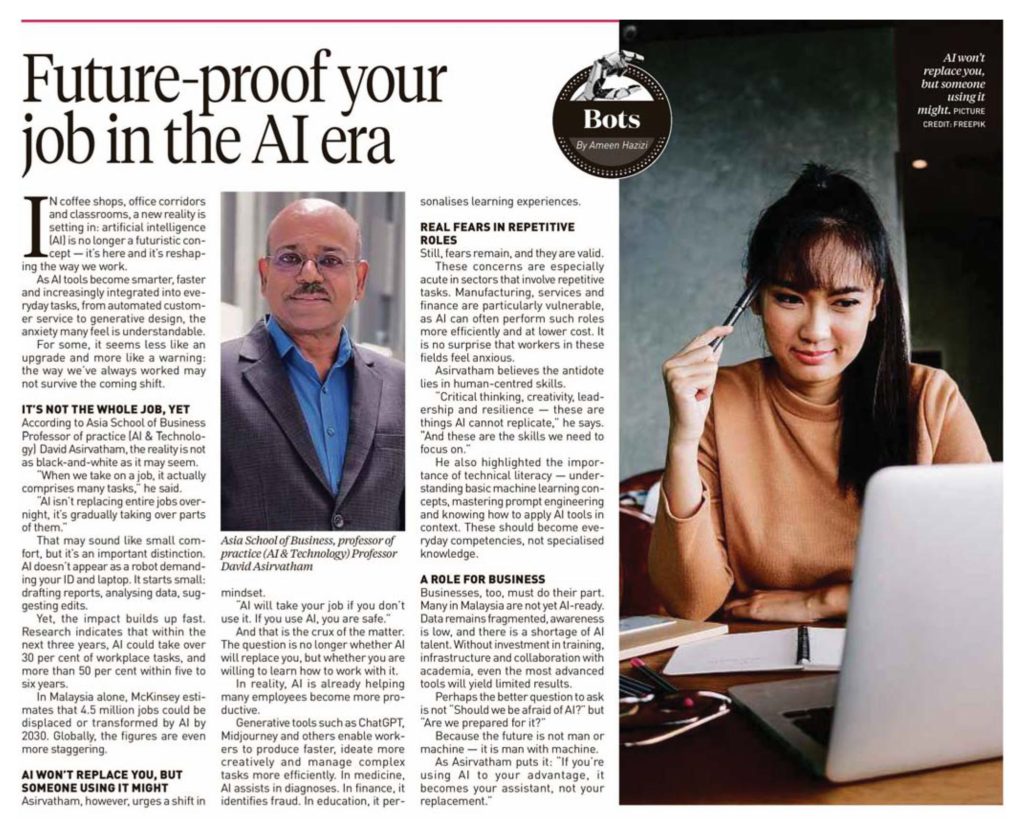In coffee shops, office corridors and classrooms, a new reality is setting in: artificial intelligence (AI) is no longer a futuristic con- cept-it’s here and it’s reshaping the way we work.
As Al tools become smarter, faster and increasingly integrated into everyday tasks, from automated custom- er service to generative design, the anxiety many feel is understandable. For some, it seems less like an upgrade and more like a warning: the way we’ve always worked may not survive the coming shift.
It’s Not The Whole Job, Yet
According to Asia School of Business Professor of practice (Al & Technology) David Asirvatham, the reality is not as black-and-white as it may seem. “When we take on a job, it actually comprises many tasks,” he said. “Al isn’t replacing entire jobs overnight, it’s gradually taking over parts of them.” That may sound like small comfort, but it’s an important distinction. Al doesn’t appear as a robot demanding your ID and laptop. It starts small: drafting reports, analysing data, suggesting edits.
Yet, the impact builds up fast. Research indicates that within the next three years, Al could take over 30 per cent of workplace tasks, and more than 50 per cent within five to six years. In Malaysia alone, McKinsey estimates that 4.5 million jobs could be displaced or transformed by Al by 2030. Globally, the figures are even more staggering mindset.
AI Won’t Replace You, But Someone Using it Might
Asirvatham, however, urges a shift in mindset. “Al will take your job if you don’t use it. If you use Al, you are safe.” And that is the crux of the matter. The question is no longer whether Al will replace you, but whether you are willing to learn how to work with it.
In reality, Al is already helping many employees become more productive. Generative tools such as ChatGPT, Midjourney and others enable work- ers to produce faster, ideate more creatively and manage complex tasks more efficiently. In medicine, Al assists in diagnoses. In finance, it Asirvatham, however, urges a shift in identifies fraud. In education, it personalises learning experiences.
Real Fears In Repetitive Roles
Still, fears remain, and they are valid.
These concerns are especially acute in sectors that involve repetitive tasks. Manufacturing, services and finance are particularly vulnerable, as Al can often perform such roles more efficiently and at lower cost. It is no surprise that workers in these. fields feel anxious. Asirvatham believes the antidote lies in human-centred skills.
“Critical thinking, creativity, leadership and resilience these are things Al cannot replicate,” he says. “And these are the skills we need to focus on.” He also highlighted the impor- tance of technical literacy-under- standing basic machine learning con- cepts, mastering prompt engineering and knowing how to apply Al tools in context. These should become everyday competencies, not specialised knowledge.
A Role For Business
Businesses, too, must do their part. Many in Malaysia are not yet Al-ready. Data remains fragmented, awareness is low, and there is a shortage of Al talent. Without investment in training. infrastructure and collaboration with academia, even the most advanced tools will yield limited results.
Perhaps the better question to ask is not “Should we be afraid of Al?” but “Are we prepared for it?” Because the future is not man or machine-it is man with machine. As Asirvatham puts it: “If you’re using Al to your advantage, it becomes your assistant, not your replacement.”
Originally published by New Straits Times.





